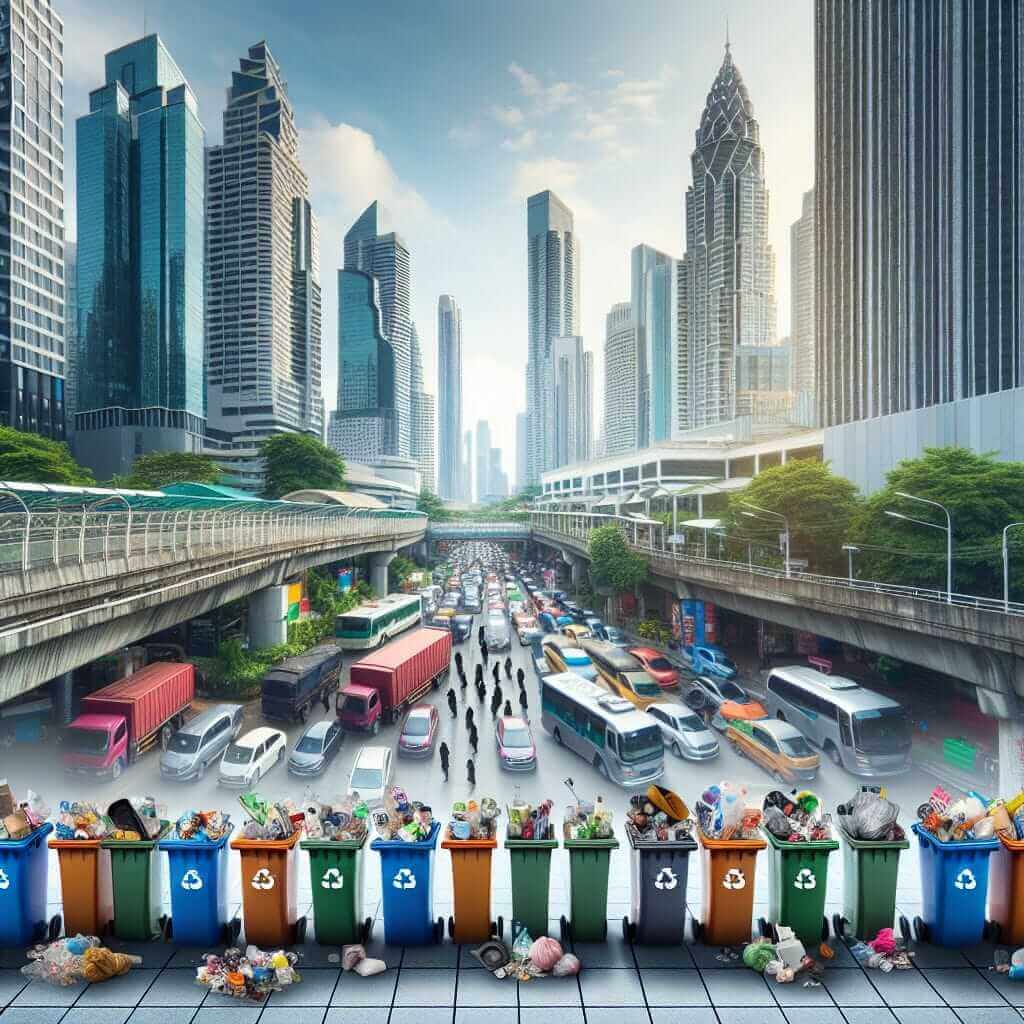The IELTS Reading section is often considered one of the toughest sections of the IELTS exam. It requires not only an extensive vocabulary but also the ability to understand complex texts quickly. One common topic that has appeared frequently in the past is waste management, specifically urban waste. Given the global trend towards urbanization and the associated waste management challenges, this topic is highly relevant and may appear again in future IELTS tests.

Practice Reading Test: Challenges of Managing Urban Waste
Passage
Challenges of Managing Urban Waste
Managing urban waste presents a complex array of challenges that municipalities across the globe are striving to address. Rapid urbanization has exacerbated the issue, causing cities to struggle with the effective disposal of the ever-increasing amounts of waste generated by their growing populations. This article will delve into the various aspects that make urban waste management a daunting task.
One of the primary challenges is the sheer volume of waste produced. As cities expand, the quantity of waste increases proportionally. The traditional waste disposal systems, often outdated and overburdened, are incapable of handling such volumes efficiently. This leads to frequent overflows, inefficient collection systems, and increased pollution.
Another significant challenge is the lack of proper waste segregation. Many urban areas lack the necessary infrastructure for effective waste separation at the source. This lack of segregation complicates recycling efforts and leads to contamination of recyclable materials, which ultimately ends up in landfills.
Economic constraints also play a crucial role in waste management challenges. Many municipalities operate with limited budgets, making it difficult to invest in advanced waste management technologies and systems. Moreover, waste collection and disposal are labor-intensive activities requiring substantial human resources and logistical planning.
The environmental impact of improper waste management practices cannot be overlooked. Unchecked waste contributes to land, air, and water pollution, posing severe health risks to urban populations. The decomposition of organic waste in open landfills generates methane, a potent greenhouse gas that exacerbates climate change.
Moreover, public awareness and participation in waste management practices remain essential yet challenging components. Educating citizens about the importance of reducing, reusing, and recycling is crucial. However, ingraining these habits into daily routines and ensuring compliance requires sustained efforts and robust public education campaigns.
Questions
-
Why is the sheer volume of waste a significant challenge for urban waste management?
a) It leads to inefficient collection systems.
b) It increases the recycling rates.
c) It promotes economic growth.
d) It reduces pollution. -
What issue arises from the lack of proper waste segregation in urban areas?
a) Increased recycling efficiency.
b) Contamination of recyclable materials.
c) Promotion of public health.
d) Decreased pollution levels. -
How do economic constraints affect waste management efforts in cities?
a) Ensuring advanced technological investments.
b) Limiting the ability to invest in improved systems.
c) Increasing recycling rates significantly.
d) Enhancing the infrastructure for waste separation. -
What environmental impact is associated with improper waste management?
a) Reduced methane gas emission.
b) Reduced economic constraints.
c) Increased land, air, and water pollution.
d) Increased public participation. -
Why is public awareness considered essential in managing urban waste effectively?
a) It helps in economic planning.
b) It reduces the need for waste segregation.
c) It promotes healthy public habits.
d) It ensures efficient methane production.
Answers
-
a) It leads to inefficient collection systems.
Explanation: The passage mentions that traditional waste disposal systems are incapable of handling large volumes efficiently, leading to overflows and inefficient collection systems. -
b) Contamination of recyclable materials.
Explanation: The lack of segregation complicates recycling efforts and leads to contamination of recyclable materials, which end up in landfills. -
b) Limiting the ability to invest in improved systems.
Explanation: Many municipalities operate with limited budgets, making it difficult to invest in advanced waste management technologies and systems. -
c) Increased land, air, and water pollution.
Explanation: Unchecked waste contributes to land, air, and water pollution, posing severe health risks and generating methane. -
c) It promotes healthy public habits.
Explanation: Educating citizens about the importance of reducing, reusing, and recycling is essential for ingraining these habits into daily routines.
Common Mistakes and Tips
Common Mistakes
- Misinterpreting the Text: Students often misinterpret the context by not paying attention to the detailed explanations provided.
- Vocabulary Gaps: Difficult terminologies may render some sections incomprehensible, leading to incorrect answers.
- Skipping Details: Overlooking crucial details or assuming information not provided in the text.
Tips
- Practice Active Reading: Annotate the text as you read. Highlight or underline key points and unfamiliar words.
- Expand Your Vocabulary: Regularly study vocabulary related to common IELTS topics, such as urbanization, environment, and economics.
- Answer Strategically: Use elimination methods for multiple-choice questions to narrow down your options.
Vocabulary
- Exacerbate (verb) – /ɪɡˈzæsərˌbeɪt/: To make a problem, bad situation, or negative feeling worse.
- Segregation (noun) – /ˌsɛɡrɪˈɡeɪʃən/: The action or state of setting someone or something apart from other people or things.
- Contamination (noun) – /kənˌtæmɪˈneɪʃən/: The presence of an unwanted substance in something.
- Municipalities (noun) – /mjuːˌnɪsɪˈpæləti/: The governing bodies of a city or town.
Grammar Points
Complex Sentences
Structure: Main clause + subordinate clause
Example: “As cities expand, the quantity of waste increases proportionally.”
Passive Voice
Structure: Subject + to be + past participle
Example: “Unchecked waste contributes to land, air, and water pollution.”
Conclusion
Scoring high in the IELTS Reading section requires consistent practice and the ability to understand and analyze complex texts. By enhancing your vocabulary, practicing active reading, and understanding grammar intricacies, you can improve your skills. Focus on these strategies and subject-specific knowledge, and remember that effective preparation is the key to success on your IELTS exam.
Good luck with your IELTS preparation!